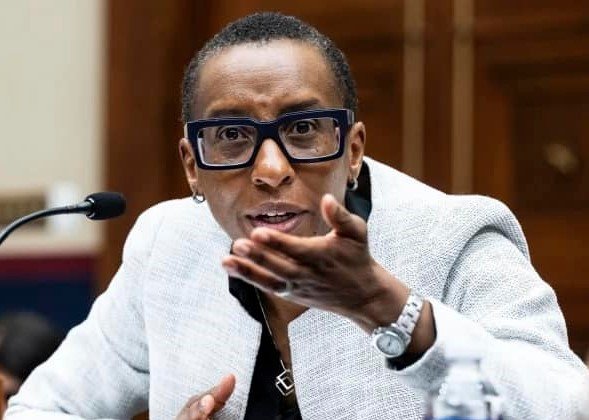 By Michael Manyibe
By Michael Manyibe
Harvard University, an institution synonymous with prestige and academic excellence, found itself in the midst of a leadership crisis as President Claudine Gay tendered her resignation on Tuesday. The announcement came following intense scrutiny surrounding her testimony at a congressional hearing on campus antisemitism and allegations of plagiarism in her academic work.
Gay’s six-month tenure marked the shortest in Harvard’s 388-year history, and she was the first Black person and second woman to lead the institution. Her resignation, while expressing a “heavy heart”, was deemed in the best interests of Harvard by both Gay and the university’s board.
The controversy began when Gay, alongside counterparts from the University of Pennsylvania and the Massachusetts Institute of Technology, faced criticism for seemingly evading questions about whether calls for the genocide of Jews violate the school’s conduct rules. Penn President Liz Magill announced her resignation shortly after the hearing faced widespread backlash.
Gay, under the spotlight, faced additional allegations of plagiarism in her political science scholarship. An investigation by the Harvard Corporation revealed “a few instances of inadequate citation” but found no violation of the university’s research misconduct standards. Despite this, the allegations continued, with the Washington Free Beacon publishing an unsigned complaint citing new instances of plagiarism.
The situation escalated over the holidays, with influential figures like billionaire investor Bill Ackman and conservative activists such as Christopher Rufo applying pressure on Harvard through social media. The Washington Free Beacon’s publication of the new plagiarism allegations further fueled the crisis.
The House Committee on Education and the Workforce had called the leaders of three prestigious universities, including Gay, to testify about their responses to the rise in antisemitism following the Oct. 7 Hamas attack in Israel. Gay’s response to a question about students calling for the genocide of Jews drew swift backlash, even prompting an apology in a later interview with the Harvard Crimson.
While the Harvard Corporation initially expressed support for Gay’s leadership in December, the controversies continued to cast a shadow over her position. The mounting pressure eventually led to her resignation.
Alan M. Garber, the school’s provost and chief academic officer, was announced as the interim president, and the Harvard Corporation stated that Gay would return to a faculty position.
As Harvard navigates this period of extraordinary challenge, the resignation of President Claudine Gay marks a significant chapter in the institution’s history. It raises questions about academic integrity, leadership accountability, and the delicate balance between freedom of expression and maintaining a safe and inclusive campus environment. The university now faces the task of selecting a permanent successor and restoring faith in its commitment to academic excellence.
EduMonitor is a comprehensive PreK-8 learning program. Visit EduMonitor for PreK–8 learning resources! Use Promo Code PreK-8LEARN to get 10% off subscription.
